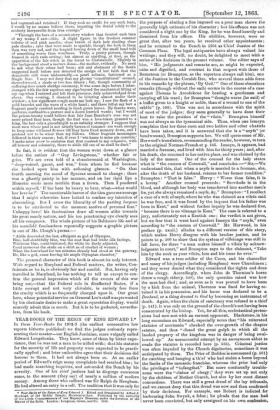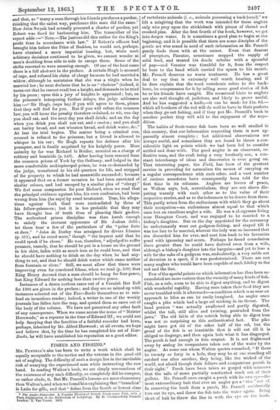YEAR-BOOKS OF THE REIGN OF KING EDWARD I. In these
Year-Books for 1302-3 (the earliest consecutive law reports hitherto published) we find the judges zealously repre- senting their master—our English Justinian, more vulgarly called Edward Longshanks. They knew, some of them by bitter expe- rience, that he was not a man to be trifled with ; that his statutes for the security of life and property were expected to be practi- cally applied ; and later authorities agree that their decisions did honour to them. It had not always been so. At an earlier period of Edward's reign many complaints bad reached hint; be had made searching inquiries, and astounded the Bench by his severity. One of his chief justices had to disgorge enormous sums, to the amount (they say) of nearly a million of modern money. Among those who suffered was Sir Ralph de Hengham. He had altered an entry in a roll. The tradition that it was only for
• Year-Booksf the Reign of King Edward I. Edited and Translated by Alfred J. Borwood, of the Middle Temple, Barrister-at.Law. Published by the authority of its Lords Commissioners of her Majesty's Treasury, under the direction of the Master of the Rolls. London : Longman, Green, and Co. 1863.
the purpose of abating a fine imposed on a poor man shows the generally high estimate of his character ; but his offence was not considered a slight one by the King, for he was fined heavily and dismissed from his offices. His abilities, however, were so great that, after ten years, he received other appointments ; and he returned to the Bench in 1301 as Chief Justice of the Common Pleas. The legal antiquaries have always valued his writings ; and they will, no doubt, be delighted to meet with a series of his decisions in the present volume. Our editor says of him, "His judgments and remarks are, as might be expected, calm and dignified, and contrast in that respect with those of Burnetoun (or Brumpton, as the reporters always call him), one of the Justices in the Cornish Iter, who several times adds force to his remarks by the phrase, By God.'" One of these obnoxious remarks (though without the oath) occurs in the course of a case against Thomas le Arcedekene for beating a gentleman and carrying off his ward ; for Brumpton "thought worse (he said) of a buffet given to a knight or noble, than of a wound to one of the rabble" (p. 100). This was not in accordance with the spirit of most of the judges ; they seem generally to have done their best to raise the position of the "vilein." Brumpton himself was not always on the tyrannical side. Thus, when one Ismeya complains that her three oxen and two heifers and other chattels have been taken, and it is answered that she is a "neyfe" (or bondwoman), Brumpton supports her. We will quote some of Mr. Horwood's translation, recommending the reader, however, to turn to the original Norman-French at p. 165. Ismeyn, it appears, had married a freeman, and lived with hint for thirty years ; and, after his death, she returned to her native place, and was claimed by the lady of the manor. One of the counsel for the lady states what is "the custom of Cornwall," and concludes :—" Sir,—We understand this, that when a neyfe is married to a freeman, she, after the death of her husband, returns to her former condition." Brampton "That is false." Hervy "Worse than false, it is a heresy." Another counsel proceeds : "Servitude is in the blood, and although her body was transferred into another man's fee, yet she always remained a neyfe, &c." Brutnpton : "I recollect a case of a writ of neyfe, where he who was claimed as a vilein said he was free, and it was found by the inquest that his father was born in Kent," and without further inquiry he was declared free, "because there is no vilenage in Kent." The case is referred to a jury, unfortunately not a Kentish one ; the verdict is not given, but we fear that it went hard against Ismeyn the "neyfe," even according to "the custom of Cornwall." Mr. Horwood, in his preface (p. xxxii.) alludes to a different version of this story, which makes Hervy disagree with his brother justice, and he points to p. 200 to show that the system of villeinage was still in full force, for there "a man makes himself a vilein by acknow- ledgment in court," and Brumpton says to the claimant, "Take him by the neck as your vilein, him and his issue for ever."
Edward was a true soldier of the Cross, and his chancellor and many of his judges (including Hengham) were Churchmen ; and they never denied what they considered the rights and dues of the clergy. Accordingly, when John de Thornton's horse threw a rough rider(p. 628), the only question raised was how the man had died ; and, as soon as it was proved to have been by a kick from the animal, Thornton was fined for having re- tained it in his possession, and his horse was declared to be a Deodand, or a thing devoted to God by becoming an instrument of death. Again, when the claim of sanctuary was refused to a thief (p. 541), it was only on the ground of the church's not having been consecrated by the bishop. Yet, for all this, ecclesiastical preten- sions had now met with an earnest opponent. Blackstone, in his long encomium on Edward, especially notes that "his reiterated statutes of mortmain " checked the over-growth of the chapter estates, and thus "closed the great gulph in which all the landed property of the kingdom was in danger of' being swal- lowed up." An unsuccessful attempt by an anonymous abbot to evade the statutes is recorded here (p. 535). Criminal justice was often impeded by the Church dignitaries, sometimes it was anticipated by them. The Prior of Boddon is summoned (p. 501) for catching and hanging a thief who had stolen a horse beyond the limits of the monastic franchise, whereas the prior had only the privileges of " infangthef." But more continually trouble- some were the "claims of clergy ;" they were set up not only by the children of Mother Church, but also by her most distant connections. There was still a great dread of the lay tribunals, and we cannot deny that this dread was now and then confirmed by their decisions. For example, one Robert is indicted for harbouring John Swynk, a felon ; he pleads that the man had never been convicted, but only arraigned on his own confession, • and that, as "many a man through his friends purchases a pardon, thinking that the safest way, perchance this man did the same." Now John Swynk had actually procured a charter of pardon, yet Robert was fined for harbouring him. The transcriber of the report adds :—"Note.—The justices did this rather for the King's profit than in accordance with law." If Robert's offence had brought him before the Prior of Boddon, be would not, perhaps, have obtained a more impartial hearing, but, while such arbitrary decisions continued to be given, we cannot wonder at men's doubling from side to side to escape them. Some of the shifts resorted to were amusing enough. Of one of the best cases there is a full abstract in the preface. A certain Hugh is accused of rape, and refused his claim of clergy because he had married a widow, although he maintains that she was a virgin when he married her ; he next declares that he is no " clericus" (indeed, it turns out that he cannot read) but a knight, and demands to be tried by his peers ; upon this a jury of knights is appointed ; but, on the prisoner's interposing further delays, the judge addresses him :—" Sir Hugh, (says he,) if you will agree to them, please God they will find for you. But if you will refuse the common law, you will incur the penalty therefore ordained, to wit, one day you shall eat, and the next day you shall drink; and on the day when you drink you shall not eat, and e contra ; and you shall eat barley bread, and not wheaten bread, and drink water, &c." At last the trial begins. The matter being a criminal one, counsel is refused to the prisoner, but a friend is allowed to whisper in his ear ; Sir Hugh repeats his defence after his prompter, and is finally acquitted by his knightly peers. More unlucky by far was Richard le Realer, arrested on a charge of robbery and homicide (p. 543). After having been rescued from the common prison of York by the Ordinary, and lodged in the more comfortable archiepiscopal prison, he was re-demanded by the judge, transferred to his old quarters for life, and stripped of the property to which he had meanwhile succeeded; because it appeared that on a former occasion he had been convicted of similar crimes, and had escaped by a similar plea of "clergy." We feel some compassion for poor Richard, when we read that the principal evidence against him, his own confession, had been wrung from him (he says) by cruel treatment. True, his allega- tions against York Gaol were contradicted by three of his fellow-prisoners ; but it is too probable that they may have thought less of truth than of pleasing their gaolers. The authorized prison discipline was then harsh enough to satisfy the sternest opponents of Sir Joshua Jebb ; let them hear a few of the particulars of the " peine forte et dure." "John de Dorley was arraigned for divers felonies (p. 511), and he stood mute," though "the inquest said that he could speak if he chose." He was, therefore, "adjudged to suffer penance, namely, that he should be put in a house on the ground in his shirt, laden with as much iron as he could bear, and that he should have nothing to drink on the day when he had any- thing to eat, and that he should drink water which came neither from fountain or river." Still, we must allow that times were improving even for convicted felons, when we read (p. 538) that King Henry decreed that a man should be hung for four pence, but King Edward for nothing less than twelve pence.
Instances of a dozen curious cases out of a Cornish Iter Roll for 1302 are given in the preface ; and they are so mixed up with instances selected out of the Year-Books themselves as to mis- lead an incautious reader; indeed, a writer in one of the weekly journals has fallen into the trap, and quoted them as eases out of the body of the volume. We have not perceived any other fault of any consequence. When we came across the name of" Meister Horewode," as a reporter in the time of Edward III., we could not help fancying that the faculties of a faithful recorder had been, perhaps, inherited by Mr. Alfred Horwood ; at all events, we hope and believe that, by the time he has completed his set of Year- Books, he will have established his reputation as a good editor.



































 Previous page
Previous page